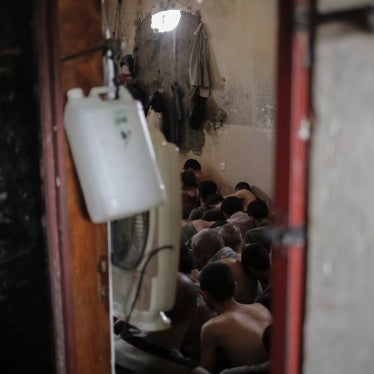Documents released Tuesday by the U.S. Department of Defense on interrogation procedures at Guantanamo Bay, Cuba, raise more questions than they answer, Human Rights Watch said today. Human Rights Watch called for a 9/11-style independent commission to probe the issue of detainee abuse.
The released documents stop in April 2003 and do not cover practices at Abu Ghraib and other military prisons in Iraq, Human Rights Watch said. Even so, they show that in December, 2002, Secretary of Defense Donald Rumsfeld approved the use of techniques, such as the use of guard dogs to instill fear in detainees, stripping detainees nude, and the use of painful stress positions, that violate the law. Rumsfeld later rescinded his approval of these techniques on Guantanamo detainees, yet they later featured prominently in the abuses at Abu Ghraib.
“This selective release of documents raises more questions than it answers,” said Kenneth Roth, executive director of Human Rights Watch. “We need an independent investigation, not a selective self-investigation.”
Human Rights Watch said that the released documents show the beginning of the story, how illegal tactics were approved in Guantanamo, but they do not show how these tactics, or even more abusive methods, were later approved and applied in Afghanistan and Iraq and resulted in the torture and other mistreatment of detainees in those places
Human Rights Watch also pointed out that the memos released Tuesday concern interrogation techniques by the Department of Defense, and that little or nothing has been provided about CIA interrogation practices.
Human Rights Watch called on the administration to release all documents relating to the treatment of detainees in the “war on terror” and in Iraq, including the 2003 memoranda from Lt. Gen. Ricardo S. Sanchez, the senior U.S. military officer in Iraq authorizing coercive interrogation techniques there.
Human Rights Watch welcomed President Bush’s public rejection of torture on Tuesday, as well as the Justice Department’s disavowal of an internal opinion that torturing terrorism suspects might be legally defensible, but said that the president had not spoken about other coercive forms of interrogation that amount to cruel, inhuman or degrading treatment or the prohibition in the Geneva Conventions of “humiliating and degrading treatment.”
Human Rights Watch also took issue with the statement in President Bush’s Feb. 7, 2002 memorandum to members of his national security team, released yesterday, that "Our values as a nation, values that we share with many nations in the world, call on us to treat detainees humanely, including those who are not legally entitled to such treatment."
“It is incredible that the President is arguing that there is no legal requirement to treat all detainees humanely,” said Roth.
Human Rights Watch called for the creation of a special commission, along the lines of the 9/11 commission, to investigate the issue of prisoner abuse. Such a commission would hold hearings, have full subpoena power, and be empowered to recommend the creation of a special prosecutor to investigate possible criminal offenses. The commission would examine, among other things, the link between the administration memos and actual practices in Afghanistan, Iraq and at Guantanamo.
Human Rights Watch said current investigations, carried out by the Department of Defense, did not have the independence or breadth necessary to fully pursue the abuse allegations, particularly in light of allegations that top U.S. officials may have ordered or condoned the torture of detainees.
“It would be unacceptable if only a handful of soldiers were made to pay for what now appears to be a policy of abuse, conceived at the top and implemented by generals,” said Roth. “The test of the Bush administration’s seriousness is whether it disavows all coercive interrogation, prosecutes those at the top who authorized abuse, and endorses an independent investigative commission.”
Human Rights Watch noted that tactics that were for a time approved by Secretary Rumsfeld, such as the use of guard dogs to instill fear in detainees and the use of painful stress positions violate both the Geneva Conventions and the Convention against Torture and other Cruel, Inhuman or Degrading Treatment or Punishment.
Two weeks ago, Human Rights Watch published a 36-page report, “The Road to Abu Ghraib,” which examined how the Bush administration adopted a deliberate policy of permitting illegal interrogation techniques – and then spent two years covering up or ignoring reports of torture and other abuse by U.S. troops, first in Afghanistan and then in Iraq.






